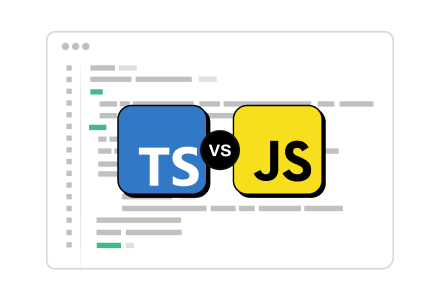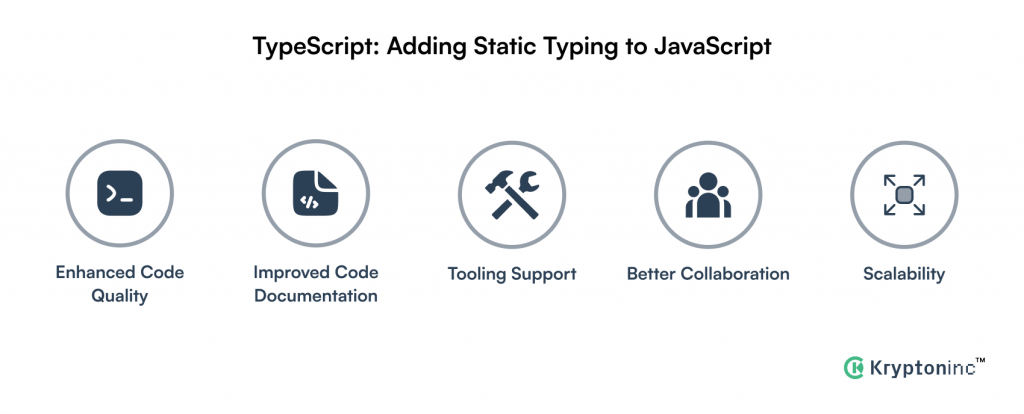Coding with Clarity: Practical Differences Between JavaScript and TypeScript

When it comes to web development, JavaScript has been the go-to language for building dynamic and interactive websites. However, as projects grow in complexity and teams expand, maintaining code quality and avoiding bugs become critical. This is where TypeScript comes into play. In this article, we'll explore the practical differences between JavaScript and TypeScript, highlighting the benefits of TypeScript's strong typing and how it can help developers write more robust code. Additionally, we'll introduce you to how KryptonInc can support your development needs, whether you choose JavaScript or TypeScript.
JavaScript: The Foundation of Web Development
JavaScript is a versatile and widely used programming language that runs in web browsers. It's known for its simplicity and flexibility, making it accessible to developers of all levels. JavaScript allows you to create interactive web pages, handle user input, and interact with server-side data.
However, as web applications grow in size and complexity, JavaScript's lack of static typing can lead to challenges in maintaining and scaling codebases. This is where TypeScript comes into play.

TypeScript: Adding Static Typing to JavaScript
TypeScript is a superset of JavaScript that introduces static typing, allowing developers to declare variable types explicitly. This additional layer of type checking provides several advantages:
1. Enhanced Code Quality
TypeScript helps catch errors during development, reducing the chances of runtime errors and improving code quality. With clear type definitions, you can catch issues early in the development process.
2. Improved Code Documentation
TypeScript's type annotations serve as documentation for your code, making it easier for developers to understand how functions and variables should be used.
3. Tooling Support
TypeScript provides powerful tooling support through code editors and integrated development environments (IDEs). This includes features like auto-completion, code navigation, and refactoring suggestions.
4. Better Collaboration
In larger development teams, TypeScript facilitates collaboration by providing a common understanding of data structures and function signatures.
5. Scalability
As your project grows, TypeScript's static typing ensures that refactoring and extending code remains manageable.
Practical Differences: JavaScript vs. TypeScript
Let's explore some practical differences between JavaScript and TypeScript:
JavaScript
- Variables are dynamically typed, allowing flexibility but potentially leading to runtime errors.
- Type errors might only surface at runtime.
- Limited tooling support for type checking and code navigation.
- Documentation relies heavily on comments.
- Codebase may become harder to maintain as it grows.
TypeScript
- Variables are statically typed, catching type errors at compile-time.
- Strong tooling support with TypeScript-aware code editors.
- Type annotations serve as clear code documentation.
- Collaboration is enhanced through shared type definitions.
- Codebases remain manageable and scalable.
KryptonInc: Your Development Partner
At KryptonInc, we understand the importance of choosing the right language for your web development projects. Whether you opt for JavaScript or TypeScript, we have the expertise to support your development needs:
- JavaScript Development: We specialize in building interactive and dynamic web applications using JavaScript. Our experienced team ensures that your projects are well-architected and maintainable.
- TypeScript Integration: If you choose TypeScript, we can seamlessly integrate it into your development stack. Our TypeScript experts will help you harness the benefits of strong typing while building robust applications.
- Code Quality Assurance: Regardless of the language you choose, we prioritize code quality and follow best practices to ensure your applications are bug-free and performant.
- Custom Solutions: We provide tailored web development solutions to meet your project's specific requirements, whether it's a small website or a complex web application.
Conclusion
Choosing between JavaScript and TypeScript depends on your project's complexity, team size, and the level of clarity and robustness you require in your code. While JavaScript remains a versatile choice, TypeScript adds a layer of static typing that can significantly enhance code quality and maintainability.
Ready to embark on your web development journey with clarity and precision? Contact KryptonInc today, and let's discuss how we can help you achieve your development goals, whether you choose JavaScript or TypeScript.
At KryptonInc, we're committed to delivering high-quality web development solutions that match your needs. Whether you prefer the flexibility of JavaScript or the robustness of TypeScript, we have the expertise to support your project. Contact us today to discover how we can elevate your web development efforts!
